Catégories
|
Thésaurus IAMM > EUROPE > EUROPE DU SUD > TURQUIE
TURQUIEVoir aussi |
Documents disponibles dans cette catégorie (1161)
 Ajouter le résultat dans votre panier Affiner la recherche
Ajouter le résultat dans votre panier Affiner la recherche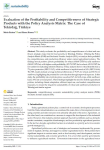
Article
This study evaluates the profitability and competitiveness of wheat and sunflower, strategic crops vital for food security, in Tekirdag, Türkiye. Utilizing the Policy Analysis Matrix (PAM) and Stochastic Frontier Analysis (SFA), we analyze their[...]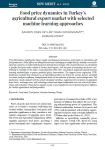
Article
Food price dynamics in Turkey’s agricultural export market with selected machine learning approaches
Price fluctuations significantly impact supply and demand mechanisms, particularly in agriculture and food production. These effects are often persistent and challenging to adapt directly, making it crucial for agrarian countries to understand t[...]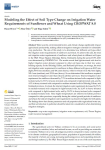
Article
Water scarcity, environmental factors, and climate change significantly impact agricultural productivity, making efficient irrigation strategies essential for sustainable crop production. The aim of this study is to determine how different soil [...]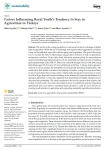
Article
The decline in the young population in rural areas has led to a shortage of skilled labor in agriculture. While the use of technology and capital is often suggested as a solution, it may not be sufficient, especially with the aging rural populat[...]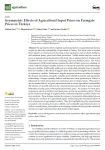
Article
The asymmetric effects of global and national factors on agricultural production negatively affect the sustainability of agriculture in Turkey. This study seeks to explore those impacts on wheat prices by focusing on key input prices such as die[...]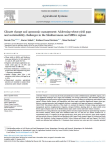
Article
CONTEXT Wheat is a crucial crop for food and nutritional security in Mediterranean and MENA regions, yet it faces significant challenges due to high yield variability, low average productivity, and substantial yield gaps. This highlights the urg[...]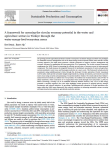
Article
The growing need for agricultural production and the consequences of climate change necessitate new paradigms for sustainable resource management such as the Water-Energy-Food-Ecosystem (WEFE) nexus and the circular economy approach. The WEFE ne[...]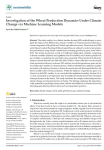
Article
This study employs two distinct machine learning (ML) methodologies to investigate the impact of 12 different key climatic variables on wheat production efficiency, a crucial component of the global and Turkish agricultural economy. Neural netwo[...]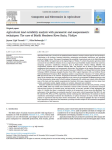
Article
Agricultural lands play a pivotal role in sustaining human existence, serving as primary sites for food production, contributing to the economy, fostering biodiversity, maintaining environmental equilibrium, and upholding social and cultural val[...]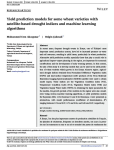
Article
In recent years, frequent drought events in Konya, one of Türkiye's most important cereal production centres, have led to increased pressure on water and soil resources, resulting in yield losses, particularly in wheat production. Alternative yi[...]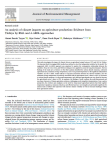
Article
A.E. Tayyar ; N. Gasim ; Ö.F. Biçen ; S. Mukhtarov |This study investigates the impact of climatic factors on agricultural output between 1970 and 2022 in Türkiye. The Bayesian Model Averaging (BMA) method was utilized to select the independent variables for the model. The augmented ARDL (A-ARDL)[...]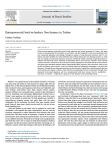
Article
Urban-to-rural migration, particularly back-to-land migration, has become prominent in Turkey. This paper focuses on entrepreneurial back-to-landers or neo-farmers, who have migrated to rural areas specifically to get into commercial agriculture[...]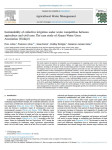
Article
F. Arslan ; F. Alcon ; S. Kartal ; K. Erdogan ; D.A. Zema |This study explores the patterns of sustainable use and management of competing water sectors in the Alanya Water Users Association (WUA) in Southern Türkiye, over eight years (2013-2020) before the SARS-CoV-19 pandemic, focusing on the impacts [...]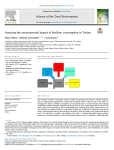
Article
The technique of fertilizer consumption increases yields from agriculture, but because it involves chemicals, there are disagreements regarding how it affects the environment. Based on this, the aim of this study is to investigate the effects of[...]
Article
Ensuring sustainability in the production and marketing of agricultural and food products after natural disasters is of critical importance to maintain beneficial nutrition for society. Examining the effects of earthquakes on the agricultural an[...]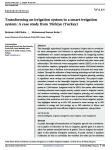
Article
The Imamoğlu Agricultural Irrigation Automation Project aims to revolutionize water management and allocation in agricultural irrigation through the establishment of a central management-based system. By integrating modern irrigation techno[...]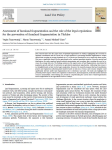
Article
This research delves into the urgent issue of farmland fragmentation in Türkiye, highlighting the necessity for farmland consolidation and the crucial role of legal regulation in preventing farmland fragmentation. Despite official data revealing[...]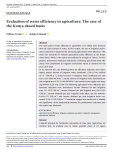
Article
The main goal in water efficiency in agriculture is to obtain more products with the same amount of water. In this respect, the use of irrigation performance indicators is important for increasing agricultural water efficiency. This study was co[...]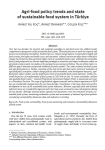
Article
Over last two decades, the research and evaluation paradigm in agri-food sector has shifted towards comprehensive perspective called sustainable food system. The heavy pressure on earth bio-capacity and massive environmental externalities, biodi[...]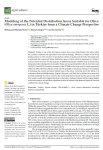
Article
Türkiye is one of the first regions where olives were domesticated, and olives reflect the country's millennia-old agricultural and cultural heritage. Moreover, Türkiye is one of the leading nations in olive and olive oil production in terms of [...]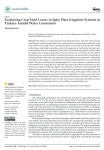
Article
Water stands as a crucial component of agricultural production. This study aims to propose water efficiency measures in agriculture as an essential element for climate change adaptation. In this study, yield losses in staple crops in agricultura[...]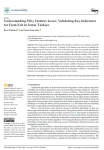
Article
This study analyses the factors that affect farmers' decisions to quit farming, using the Izmir region of Türkiye as a case study. A sample of 195 farmers was surveyed to identify the factors influencing this decision. Factors such as the farm t[...]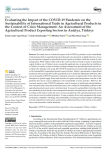
Article
This study aims to evaluate the impact of the COVID-19 pandemic on the sustainability of international trade in agricultural products through semi-structured, in-depth interviews, focusing on businesses engaged in agricultural product exports in[...]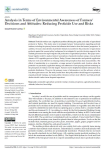
Article
Pesticide residues are a significant problem affecting the quality and safety of agricultural products in Turkey. This study aims to investigate farmers' risk perception regarding pesticide residues, including the primary factors that influence [...]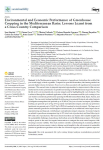
Article
S. Sturiale ; O. Gava ; M. Gallardo ; D. Buendía Guerrero ; D. Buyuktas ; G.E. Aslan ; A. Laarif ; T. Bouslama ; A. Navarro ; L. Incrocci ; F. Bartolini |In the Mediterranean region, the expansion of greenhouse horticulture has enabled the year-round supply of fresh vegetables. Compared to open field horticulture, this farming method can generate higher returns for farmers. However, it is often a[...]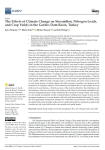
Article
A. Özdemir ; M. Volk ; M. Strauch ; F. Witing |The Mediterranean region is highly vulnerable to climate change. Longer and more intense heatwaves and droughts are expected. The Gordes Dam in Turkey provides drinking water for Izmir city and irrigation water for a wide range of crops grown in[...]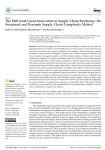
Article
At the heart of supply chain innovation lies the challenge of complexity, a pivotal force shaping the pathways to resilience and sustainable success in today's business environment. Drawing from the resource-based view, dynamic capabilities, and[...]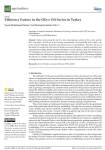
Article
Turkey ranks among the top five olive oil-producing countries in the world, and the olive crop plays a crucial role in its economy, economically, environmentally, and socially. One of the primary challenges facing the agricultural sector is its [...]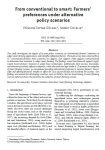
Article
This study investigates the impact of ex-ante policy scenarios on conventional farmers’ intentions to adopt smart farming applications and identifies influential factors. Through survey data collected from 117 conventional farmers, three scenari[...]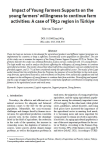
Article
There has been an increase in the demand for agricultural products and different support programs are implemented by countries to keep a sufficient, economically active population in agriculture. The aim of this study was to examine the impacts [...]










